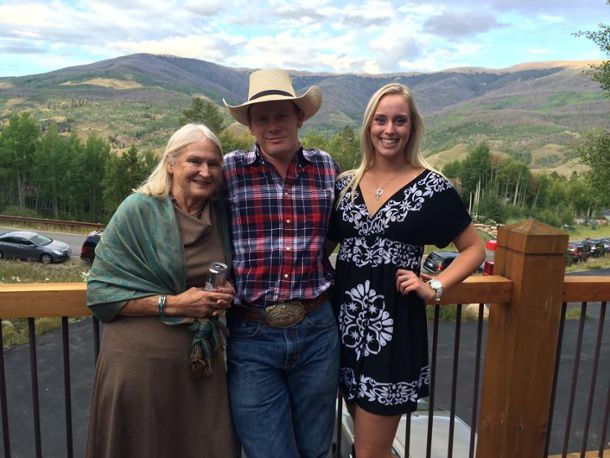Meet Arizona Agriculture's McDonald Family
Published
4/29/2015
By Justen Ollendick, Arizona Farm Bureau Intern: The McDonald Family of Graham, Pinal, and Maricopa counties have dedicated their entire lives to serving those who are looking for an opportunity to grow themselves as young agriculturalists and individuals. You can find Sandy and her son, JC, lambing ewes during pre-show seasons, and standing ringside to support those 4-H and FFA youth that purchase their livestock. The McDonald Family is a true example of servant leadership, the basis of our membership.

The McDonald family was drawn to agriculture because of family, a love of the outdoors and so much more.
An interview with Sandy & JC McDonald - Willcox, Arizona
Part of an ongoing series about Arizona Farming and Ranching families.
Tell us about your farm, ranch, or agribusiness operation(s): Back when John and I lived in Scottsdale, we had 8 pairs of registered Hereford cows that could not be kept on the irrigated
Why did you choose to go into agriculture? The love of the land and outdoors. Watching our livestock, or a new crop grow is a feeling that cannot be explained. It is a feeling that God has given us all. The need for open spaces is in all of us. People in cities and town flock to golf courses to see the uncluttered view of the outdoors, we have the luxury of having that view from our front porch. I (Sandy) currently work for the USDA/NASS.
What changes have you seen in your lifetime as it relates to farming, ranching, or agribusiness? A typical farm or ranch 50 years ago produced a wider variety of commodities than those operating at the end of the century. Farm operators and the country’s population were much more self-sufficient years ago. Farms and ranches are now much more specialized, with a small number of operators producing the majority of agricultural products consumed today.
Will anyone in your family -
My family was very involved in 4-H when I was a toddler. I lived to be outside with the animals. I didn’t play with toys if they weren’t farm related. (no Hot Wheels for me). I showed open at the Arizona State Fair before I was a 4-H’er.
My first memories of U of A was at the farm following the big kids around on Judging Day. I knew I wanted to go to college there. My dad worked at Arizona State University and my 4 brothers and sisters all graduated from ASU. I could hold my own rooting for U of A over a houseful of ASU graduates.
The FFA bug bit me in high
The importance of good records and bookkeeping was one of the most important parts of the program. No agricultural endeavor can be successful without them. I was able to buy my first ranch from my parents and with the help of the Farm Service Agency right after high school.
The FFA program is designed to show the values and attitudes of successful leaders. FFA helps kids to identify their potential and develop a sense of purpose and responsibility. In leadership
The experience of college did broaden my practical
What are your community activities? Scottsdale back in the 1950s was a farming community. I played as a child along the open irrigation ditches throughout the town. I was always going over to Schroders Dairy on Indian school road and Zimmerman Dairy on Miller. This was back in the day when
What do you enjoy doing? Ranching, Hunting,
Why are you a farm bureau member? Farm Bureau is the voice for farmers and ranchers not only in Arizona but throughout the United States. Being a member is a way to put your support behind the farms and ranches, which produce your family’s food. The membership dollars are used in a lot of educational programs and events. They’re a voice for Ag.
How will the next generation of agribusiness leaders have to operate? Smarter not harder. The new innovations in the Ag industry have helped producers produce more effectivity. Of course, along with this is the expensive land and equipment to keep production up, make a living and not break the bank.
In Arizona in some areas
What’s the best business advice you’ve ever been given and/or experience? Or, what business-oriented advice would you give young farmers/beginning farmers? “The farmer has to be an optimist or he wouldn't still be a farmer.” ~Will Rogers. Agriculture and the roles of people involved in farming, particularly women and new farmers, are changing. Make sure you are doing what you love. Anyone can get a job, being excited about your job is the challenge. Make the Best Better, and leave the world a better place for the generations to come.